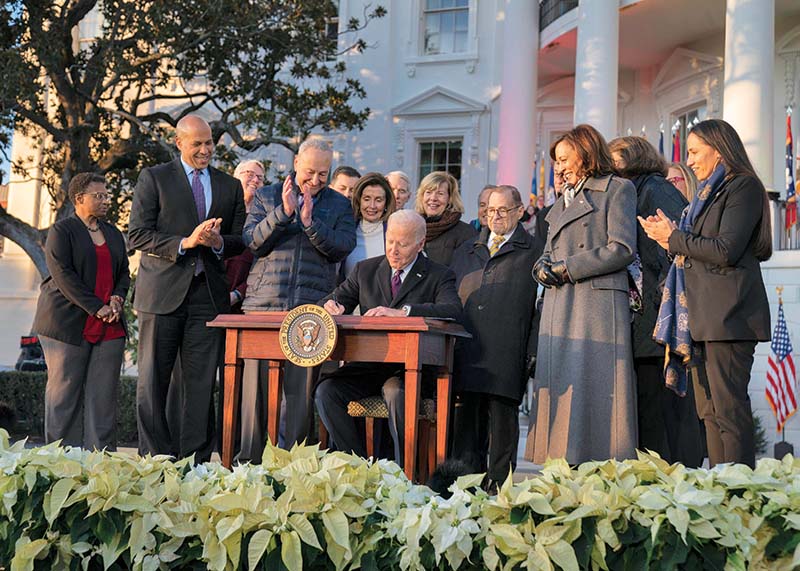Solution or Sellout?
Todd R. McFarlandMelissa Reid March/April 2023Can America navigate the cultural conflict around marriage, religious freedom, and LGBTQ nondiscrimination? With the Respect for Marriage Act, Congress moves beyond a winner-take-all approach.
The current political toxicity in Washington, D.C., means that every question of public policy attracts stridently different interpretations from both left and right. So the level of inflammatory, contradictory messaging that surrounded passage of the Respect for Marriage Act (RFMA) late last year was hardly surprising.
Is the RFMA “a Trojan horse of the left,” intended to undermine the religious freedoms of all those who hold to a traditional view of marriage and human sexuality? An unnecessary codification of same-sex marriage that will ultimately endanger the tax-exempt status of conservative religious institutions?
Or is this new law a narrowly tailored measure that provides much-needed legal certainty for those who’ve entered same-sex unions in recent years? A law that also includes language carefully preserving the status quo of religious freedom protections?
Vital Context
For many Americans, the RFMA seemed to blaze into the headlines out of nowhere in July of last year. For those who track the continuing legal and legislative skirmishes around issues of religious freedom and LGBTQ nondiscrimination, however, the arrival of this proposed law in Congress came as no surprise.
The genesis of RFMA can be traced back to the 2015 Supreme Court case of Obergefell v. Hodges, in which a majority of the Court found a constitutional right to same-sex marriage. This much-debated decision was grounded on a jurisprudential doctrine known as “substantive due process.” In recent decades this doctrine has also provided a legal framework for other so-called unenumerated constitutional rights (or rights that are not explicitly spelled out within the approximately 7,600 words of the U.S. Constitution and its amendments). These have included the right to use contraceptives, the right of workers to engage in employment contract bargaining, the right to abortion, and the right to enter interracial marriage.1
Prior to Obergefell, there was a patchwork of state laws relating to the legality of same-sex marriage. But in Obergefell the Court said that as a matter of federal constitutional law, a state could not deny a person the right to enter a same-sex marriage, and that such a marriage must be recognized within that state. Since Obergefell more than a half million Americans have entered same-sex unions and, according to surveys, a majority of Americans from across the political and religious spectrum have become increasingly supportive of these marriages.
This apparently settled state of affairs, however, was disturbed by a 2022 Supreme Court decision that, on its face, seemed far removed from the question of same-sex marriage. The landmark abortion rights case, Dobbs v. Jackson, sent shock waves through the LGBTQ rights advocacy community—not because of its majority opinion, but because of a single concurring opinion written by conservative justice Clarence Thomas.
The majority in Dobbs held that the right to abortion could not be properly found within the Constitution. These justices rejected substantive due process as a basis for abortion rights, and they relied instead on an approach to constitutional interpretation informed by the intent of the Constitution’s writers as revealed through “history and tradition.” At the same time, however, the majority sought to calm fears about the durability of other unenumerated constitutional rights also grounded on doctrine of substantive due process. Justice Samuel Alito wrote for the majority, saying that “nothing in this opinion should be understood to cast doubt on precedents that do not concern abortion.”
Yet Justice Thomas disagreed. In his concurrence, he called on the Court to “reconsider all of this Court’s substantive due process precedents,” including Obergefell. Although this was just one justice out of nine, his comments raised a specter of uncertainty for LGBTQ rights advocates. Would the hundreds of thousands of same-sex marriages entered into post-Obergefell be ruled invalid by a future Supreme Court decision? Within weeks the Respect for Marriage Act was drafted, and on July 18, 2022, it was introduced into the House of Representatives. One day later it was passed by the House, 267 to 157, with 47 Republicans voting in favor of the legislation.
An Altered Political Climate
The swift introduction and easy passage of the RFMA in the House reflects a broader reality that is important to understand. That is, the past three decades has seen a radically changed political and cultural landscape when it comes to issues of religious freedom and LGBTQ rights.
Back in 1993, for instance, the landmark Religious Freedom Restoration Act was passed with broad bipartisan support and signed into law by a Democratic president, and it significantly bolstered the legal protections available to all Americans of faith. Today, however, the appetite in Congress for supporting religious freedom initiatives has drastically waned. Instead, this fundamental human right has become a divisive issue. It has increasingly been branded on the left as a “cover for bigotry” or merely as a tool used to gain the “legal right to discriminate.”

It’s no surprise, then, that the original version of the RFMA that was passed by the House in July last year and sent to the Senate for consideration contained no acknowledgment of much-needed religious freedom protections. This absence spurred a group of religious freedom advocates and faith groups, including the Church of Jesus Christ of Latter-day Saints, the National Evangelical Alliance, and the Seventh-day Adventist Church, to push for an explicit affirmation of existing religious freedom protections. Senators Susan Collins (R-Maine), Rob Portman (R-Ohio), Kyrsten Sinema (D-Arizona), Thom Tillis (R-North Carolina), and Tammy Baldwin (D-Wisconsin) were responsive and worked together on an amendment that would address the core religious freedom concerns raised by the bill. The amended bill passed the Senate and the House and was signed into law by President Biden on December 13, 2022.
A Narrow Bill
The wildly varying interpretations of what is contained in the RFMA suggests that many of those opining about the legislation have not taken the time to read it.
The scope of the law is narrow and—contrary to many reports—does not require states to perform same-sex marriages. What it does say is that states must recognize both the same-sex and interracial marriages of other states. In practical effect, it codifies the decision in Obergefell. It also repeals a 1996 law, the Defense of Marriage Act, which had already been held unconstitutional by a 2013 Supreme Court decision, Windsor v. United States.
The RFMA also makes it clear that plural marriages or polygamous relationships would not have to be recognized.
The religious liberty protections in RFMA reflect comments made in the Obergefell decision that affirm traditional heterosexual views of marriage as honorable and worthy of respect. Thus, the RFMA states: “Diverse beliefs about the role of gender in marriage are held by reasonable and sincere people based on decent and honorable religious or philosophical premises.”
The RFMA also contains a provision making it clear that churches, mosques, synagogues, religious educational institutions, and other religious nonprofits can’t be sued if they refuse to “provide services, accommodations, facilities, goods, or privileges” for conducting or celebrating a same-sex marriage.
It’s important to note that the RFMA changes nothing about the right of religious institutions to make hiring decisions based on religious considerations. Equally, the law does not diminish the ability of religious affiliated educational institutions to administer themselves according to their religious beliefs or to be eligible for state accreditation. The Respect for Marriage Act simply does not address these questions, and thus leaves the status quo on these issues undisturbed.
Limited protection?
Some critics of RFMA have argued that the law doesn’t go far enough in its religious freedom protections. They point to the fact that these protections are focused solely on religious institutions and say nothing about the religious freedom rights of individuals such as small business owners—the “wedding cake baker and website maker” cases.
Clearly this piece of legislation does not cover all the varied situations in which religious free exercise rights may come into conflict with nondiscrimination requirements. But then the RFMA was never intended to be a comprehensive nondiscrimination bill, and thus the religious liberty protections it contains are also not comprehensive. Rather, the religious freedom protections in RFMA are tailored to fit the specific issues addressed in this bill.
The question of individual religious liberty rights in the context of LGBTQ nondiscrimination continues to be addressed by the courts in such cases as 303 Creative v. Elenis,2 and it’s clear the current Supreme Court is disposed to give both a broad interpretation and robust protection of individual religious freedom rights in these instances.
Ideally, of course, these and other related issues would be taken up by Congress in a broader piece of legislation such as Fairness for All, which would provide carefully crafted LGBTQ nondiscrimination protections and strong religious freedom protections.3
A Way Forward
Since 2015 civil recognition of same-sex marriage has been the law of the land, and the passage of RFMA leaves this reality unchanged. But RFMA has achieved one incremental but significant point toward enhanced religious liberty protections. Prior to RFMA, there existed no congressional affirmation that religious viewpoints hewing to a traditional understanding of marriage as between one man and one woman were inherently decent and worthy of respect. That declaration is now on the congressional record. Although more can and must be done to clarify the scope of religious freedom rights in this area of law, this declaration provides an important starting point for religious institutions and individuals as they respond to attempts to impose legal penalties on those who hold to a heterosexual definition of marriage.
The passage of RFMA provides another reason for optimism. It has proved beyond a doubt that the conversation around LGBTQ rights and religious freedom rights doesn’t have to end in a zero-sum, winner-take-all outcome. In recognizing the needs of both the LGBTQ community and those concerned with religious freedom protections within one piece of legislation, the RFMA has created a new paradigm. It’s a paradigm that demonstrates the ability of good faith dialogue to find solutions to apparently insoluble challenges. And it’s a paradigm that proves the ability of the law to accommodate diverse perspectives and beliefs without weakening religious freedom—a cornerstone liberty that for more than four centuries has defined our unique “American experiment.”
1 See Michael Peabody, “Uncharted Territory,” Liberty, Nov/Dec 2022.
2 In this case, a website designer contends that she should not be forced under a state nondiscrimination law to engage in speech (website design) that counters her religious conviction that marriage is a union only between one man and one woman.
3 See, Melissa Reid, “Bill Protects the Vulnerable,” Liberty, July/August 2021.
Article Author: Todd R. McFarland
Article Author: Melissa Reid
Melissa Reid is the associate editor of Liberty.
